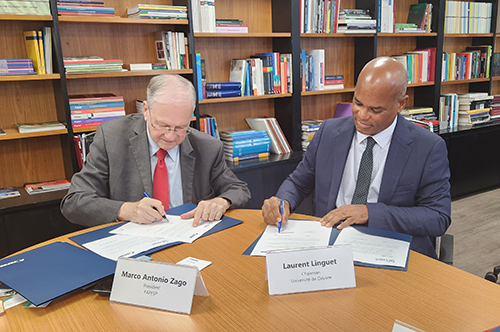


Marco Antonio Zago, President of FAPESP, and Laurent Linguet, President of the University of French Guiana, signing the cooperation agreement (photo: Daniel Antonio/Agência FAPESP)
Published on 01/22/2024
Agência FAPESP – On November 30, 2023, FAPESP and the University of French Guiana (UG) signed a scientific and technological cooperation agreement to foster interaction between researchers from São Paulo state and the French overseas territory through the joint funding of research projects. The agreement will last five years, with the possibility of renewal if both parties so desire.
During his visit to FAPESP, UG President Laurent Linguet expressed his institution’s interest in collaborating with Brazil in research on the Amazon. French Guiana, which is part of France and hence of the European Union, is almost entirely covered by Amazon Rainforest. “I believe we can do a great deal together for our populations, for the forest, and for our countries,” he told Agência FAPESP. “I see many common interests, especially in research on ecology, biodiversity, silviculture, and the impact of climate change on the Amazon.”
Linguet was accompanied by Antoine Primerose, Director of UG’s Amazon Institute for Biodiversity and Sustainable Innovation; Giulia Manera, Pro-Rector for International Relations; Ghislaine Prévot, Pro-Rector for Research; and Nadège Mézié, Science and Technology Attaché at the French Consulate in São Paulo.
The delegation was welcomed by FAPESP President Marco Antonio Zago, who spoke about the possibility of UG’s joining the Amazon+10 Initiative. “This is an initiative originally proposed by FAPESP and now with FAPs [research funding agencies] from all states in Brazil. We recently issued a new call for proposals to undertake scientific expeditions in the Amazon, and foreign bodies are invited to participate. However, I believe UG’s participation could be negotiated not as a foreign entity but as an entity of the Amazon region, as a member state,” Zago said.
Other research lines on which there is interest in collaborating and which were mentioned during the meeting were infectious and transmissible diseases, including arboviral diseases such as zika, dengue and chikungunya; chronic diseases, such as diabetes; sustainable use of biodiversity; and sustainable construction using green materials, such as biomass.
“We chose three priorities that are both academic and social: sustainable food, alternatives to promote global health, and sustainable construction. We’ve already achieved positive results on these, and we mean to do so even more in collaborative projects,” Primerose said.
“Construction wasn’t originally on my list, but I think it’s very important. I’m happy to know they’re already in touch with the University of São Paulo’s São Carlos School of Engineering. FAPESP is ready and willing to support research on this topic,” Zago said.
Concepta McManus Pimentel, an advisor to FAPESP’s Scientific Director, and Cláudia Tony, an advisor to its President, also took part in the meeting.
Source: https://agencia.fapesp.br/50696